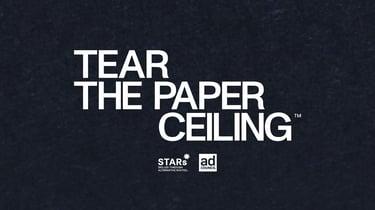Tearing the Paper Ceiling, Supporting STARs
Opportunity@Work, in collaboration with the Ad Council, recently launched The Tear the Paper Ceiling campaign to raise awareness about the additional challenges faced by those skilled through alternate routes (STARs) when entering the workforce. The paper ceiling is defined as, “the invisible barrier that comes at every turn for workers without a bachelor’s degree. See also: no alumni network, biased algorithms, degree screens, stereotypes, and misperceptions.” https://opportunityatwork.org/tear-the-paper-ceiling/.
STARs make up 70 million people in the United States who are set back from others in their job search, while others are pushed forward for the same positions. STARS come from many diverse backgrounds and bring well-rounded perspectives to every company they work for.
Qwasar supports the work of many in this space pushing to get more STARs into the workplace and to highlight them for their resilience and efforts. We implement skills-based, affordable training options to train STARs faster. Our options allow learners from every background to receive a quality technical education, prepare for technical interviews, develop a strong technical portfolio, and gain access to employer hiring partners. The vast majority of learners at Qwasar are STARs, which is why we believe the Tear the Paper Ceiling campaign is crucial to raising awareness of the ceiling that exists for a large group of job-seeking, skilled learners in the United States with strong capabilities.
Who are STARs?
STARS include military veterans, opportunity youth, returning citizens, returning caregivers, workers in rural communities, workers in roles vulnerable to automation etc. STARs are located in all regions across the country, including both urban and rural areas. The STARs population has a similar gender distribution as the active population of workers in the U.S. The ethnic makeup of STARS is: 62% of African Americans, 55% of Hispanics, and 50% of Non-Hispanic Whites.
The Qwasar community is made up of over 50% minorities and has folks from all across the country with a wide range of experiences. We have everyone in our community from veterans to working mothers to healthcare workers to retails workers to musicians.
Excluding STARs Excludes Talent From the Pipeline
When a company doesn’t consider and source talent from every angle, their pipeline suffers. Building a diverse and qualified pipeline is a problem almost every company faces, regardless of industry as it takes knowledge and understanding of in-demand skills and competency measurements. Many companies historically look at degrees on paper as the deciding factor of building a pipeline, leaving out qualified and diverse talent who are skilled and prepared, but blocked by the paper ceiling. This is what happens when a company struggles to build a reliable pipeline. Retaining quality employees who are skilled in the areas most needed by your organization are hard to find, if you don’t know where to look.
Focusing on the in-demand skills before looking at someone’s education is the first step. A degree on a piece of paper does not define someone's worth, but instead what they are capable of doing and performing. Skills assessment and measurements are a more accurate measure of determining if a candidate is qualified and prepared for your technical teams. Many of these candidates may have been skilled through alternate routes (STARS).
STARs Have Transferrable Skills, Often Learned Through Skills-based Programs
STARS already have many skills for higher wage jobs but are blocked by the paper ceiling. Some of these skills include: active learning, active listening, persuasion, social perceptiveness, service orientation, negotiation, reading comprehension, judgment and decision making, critical thinking, and coordination. (https://opportunityatwork.org/our-solutions/stars-insights/reach-stars-report/)
These essential skills can be developed outside of the historical pathway of a four-year university degree. Some of the most critical ways to develop these skills are through on-the-job and flexible training models. The overlap in skills that STARS already have and the skills required for higher for higher wage jobs lends no excuse outside of the paper ceiling and discrimination. The numbers are staggering at over 70 million STARS in the United States who are stuck in low/middle-wage positions with the knowledge and skill sets for higher-paying jobs, compared to the 60 million who have bachelor’s degrees.
Incorporating projects, group work, and role-play help learners develop and grow in their skills to push beyond their own boundaries. This style of learning is different from the traditional lecture-based learning that is prevalent in most educational settings. Knowledge transmission is far more difficult for the average learner, so providing skills-based instruction enables learners to succeed. We fully support skills-based learning and implement it throughout our programs in our active, skills-based approach. We believe in the value of a learner skilled in this route and how beneficial it is to understand and develop competency in a skill. It’s important to note that we are one type of program where skills can be learned outside of the traditional university setting. Some other options include apprenticeships and community college programs.

Tearing the Paper Ceiling Through Affordable Programs
The paper ceiling can be torn apart through creating and providing access to affordable programs for learners of all backgrounds, and with specific action from employers to not exclude STARs when they hire. When learners are limited to certain programs due to financial constraints, barriers start to form and only some can afford education that enables them to access higher-paying jobs. When a program is at an affordable price point, learners from a wide variety of backgrounds can participate in training to gain skills and access career paths. Another aspect of Qwasar programs is that we offer monthly program payment options to enable learners to pay in smaller installments rather than all at once. This receives the financial burden and impact of one large payment. Cost should never be a barrier to a quality education and this is why we do what we do.
With part-time and full-time program options, as well as Saturday cohorts, learners with other commitments besides learning can access training options. If someone works full or part time or is a parent, there are program options designed to fit these schedules. By providing flexibility and offering programs with differing schedules, learners make less sacrifices and can make better commitments to the program.
Working with our employer partners, we’ve successfully and repeatedly helped STARs get into living wage jobs with strong career prospects. Employers who recognize the value of STARs as an untapped talent population, and who are willing to hire candidates even though they don’t have Computer Science degrees, are finding strong technical talent at Qwasar. With salaries on par with their CS-degree-holding counterparts, this is how employers and Qwasar are tearing the paper ceiling.
We Celebrate Employers Who Actively Want to Hire STARs and Who Work With Us
As a company, we at Qwasar support the upward mobility of STARs in every aspect of our programs. Within our curriculum, we offer career support through resume reviews and an entire season dedicated to technical interview preparation. Learners are thoroughly prepared for interviews and on-the-job success, before they leave Qwasar. We truly believe in breaking down the barriers that stand in the way and ending the stigma that no degree equals no skill. We fully support Opportunity@Work, as well as their many partners, in their campaign to tear the paper ceiling and provide clear and transparent pathways for STARs. Many of our alumni are STARs and we are incredibly proud of the impact they are making in industry. We also celebrate employers who are actively engaged and committed to hiring STARs and who work with us. Shoutout to our employer partners: Claris and their business partners, Workday, and LinkedIn.



